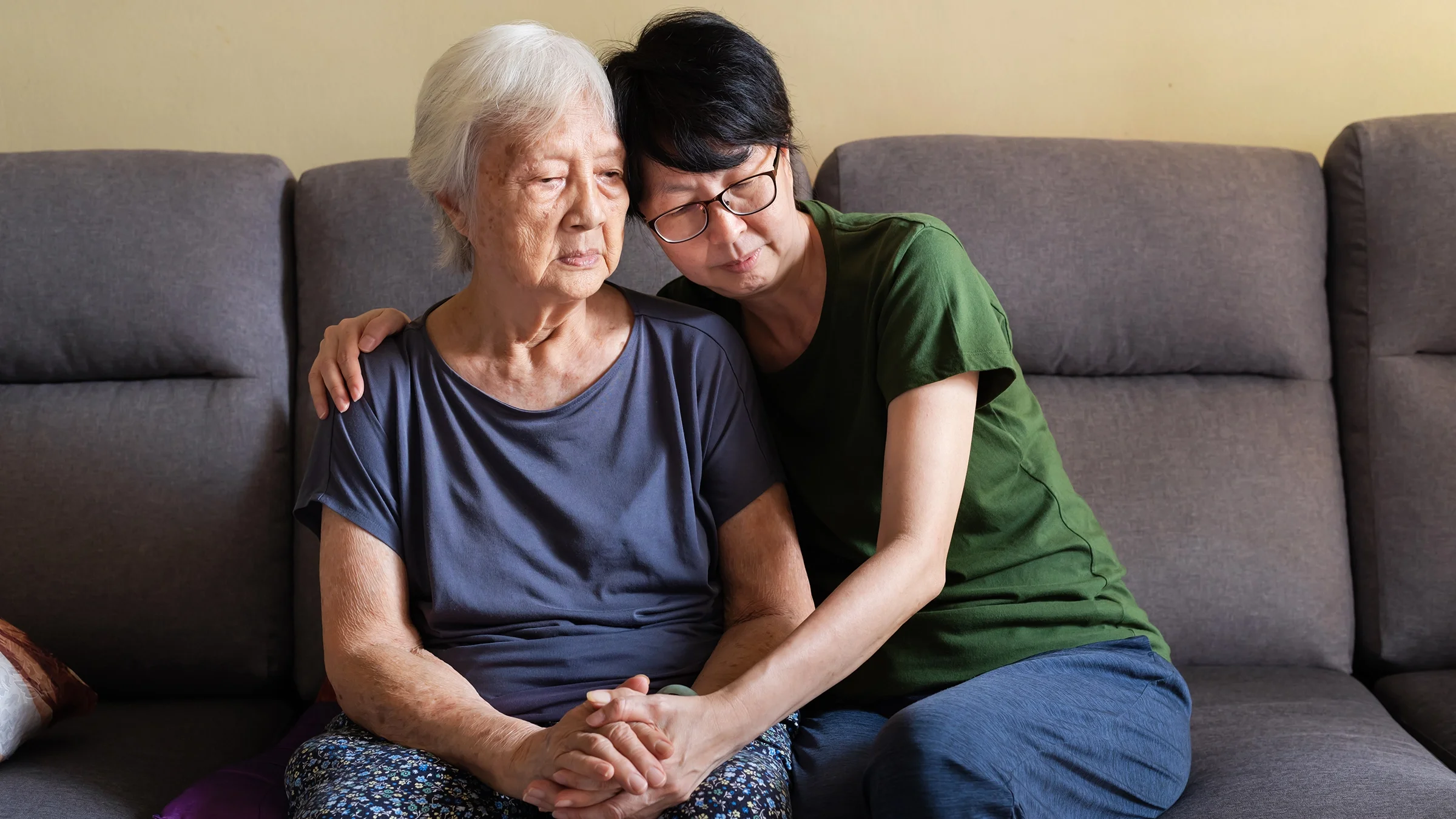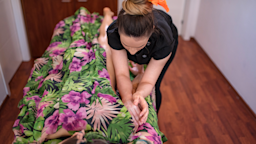Key takeaways:
Although Asian Americans report lower rates of mental health concerns and conditions, additional data shows that this may not accurately reflect the community’s reality.
In particular, Asian American older adults are at risk for not having their mental health concerns appropriately treated.
Several reasons why Asian American older adults do not seek proper mental health services include cultural and communication barriers, the COVID-19 pandemic and related anti-Asian violence, and immigration trauma.
Having open discussions about mental health struggles is a great place to start in reducing stigma surrounding the issue.
Asian American, Native Hawaiian, and Pacific Islander people (AANHPI) make up over 6% of the American population. And of those 26 million people, 15% report living with at least one mental illness in the past year. But they are three times less likely to pursue mental health treatment compared to white Americans.
Older AANHPI individuals are no exception to this statistic. Even though older Asian Americans report the lowest number of mental health issues among other racial groups, data shows that older Asian American women rank first in death by suicide.
What is the cause of this disparity? As it turns out, there are several reasons why the data does not accurately reflect the real experiences of AANHPI older adults. Some of these reasons include cultural differences, language barriers, and immigration trauma, as well as backlash from the COVID-19 pandemic.
What factors contribute to mental health conditions affecting Asian Americans?
It is important to note that AANHPI subgroups experience different cultural, religious, socioeconomic, and immigration-related circumstances. All of these may result in very specific mental health conditions.
For example, the mental health struggles of Japanese Americans living with the aftermath of internment camps of World War II differ from those of Native Hawaiians, who still deal with the effects of Hawaii’s colonization.
Culture as a barrier to care
Fundamental differences between Eastern and Western attitudes toward mental health greatly affect the mental health of Asian Americans, and elderly AANHPI people in particular. Compared to other racial groups, Asian Americans are 50% less likely to pursue mental health treatment. Mental health problems in this community are often regarded as a sign of weakness or result of poor parenting.
Public acknowledgment of a mental illness is not only a reflection of an individual’s shortcomings, but also their family’s. For this reason, many Asian Americans prefer to keep their issues within the family. They only seek out professional help once the situation reaches a critical level.
Because many older Asian Americans immigrated to America at a later time in life, their mindsets may still reflect their native values. Data shows that American-born Asian Americans are much more likely to use mental health services than those born outside of America. Asian people who were not raised in the U.S. also report more negative views of mental health treatment than their American-born counterparts. To many, psychological issues are signs that someone is weak or “crazy.”
Language and communication barriers
Overall, nearly 32% of Asian Americans are not fluent in English. In many Asian American families, senior family members often have to rely on their children (and even grandchildren) for translation and other daily tasks, such as using the internet or public transportation. Since the traditional hierarchy in many Asian families views older adults as the wisest, their dependency on others can lower their self-worth and self-esteem.
Read more like this
Explore these related articles, suggested for readers like you.
Seeking mental health treatment is no exception. Difficulty navigating the healthcare system with limited English skills is one of the reasons why about 7% of Asian Americans and 10% of Pacific Islanders do not have health insurance.
Trauma from immigration
The immigrant experience can be traumatic, especially for those from conflict areas. For instance, the "perpetual foreigner” stereotype leads to increased feelings of isolation and loneliness because one’s identity is constantly being questioned. Immigrants find that racial discrimination and stress result in additional trauma, and this trauma can be passed down to younger generations.
Immigration status also presents challenges in accessing healthcare. Some AANHPI immigrants may avoid pursuing mental health care services due to fear of threatening their immigration status or citizenship application process.
Challenges in research
As mentioned above, data on mental disorders in the AANHPI community are inaccurate. This results in the misconception that there is no demand for culturally competent mental health care in the AANHPI community.
Part of this is the result of some mental disorders that can only be described in one’s native language. For instance, taijin kyofusho is the fear of interpersonal relationships due to the enormous fear of offending others. It is unique to Japan.
Also, the mental health model in America is still based on Eurocentric perspectives that do not consider the effects of Eastern culture on psychological conditions, particularly for older Asian Americans. In particular, Western care tends to address mental and physical health separately, whereas Eastern methods take more of a holistic approach, which can influence health outcomes.
This lack of cultural competence among healthcare providers and researchers means that the older Asian American population is not being served to its fullest capacity.
COVID-19 and Asian American mental health
In addition to all of the reasons listed above, the mental well-being of older Asian Americans has also been heavily affected by the COVID-19 pandemic and related stigmas.
Studies show that the pandemic’s mandated isolation and removal of family support resulted in a notable rise in depression, anxiety, and declines in physical health among AANHPI seniors.
Anti-Asian hate crimes only added to these statistics. The rise in anti-Asian violence over the past few years has resulted in additional barriers to mental health care due to shame as well as the fear around having to recount traumatic events. Asian American older adults who were victims of racial hate crimes reported higher levels of stress due to social isolation (65.5%) compared to those who did not experience hate crimes (43.4%).
Why is there a stigma around mental health conditions in Asian cultures?
The main explanations for the stigma surrounding mental illness in Asian Americans are closely connected to Asian philosophies and family structure.
Incorrect understandings of mental illness
In many Asian cultures, mental illness is (incorrectly) seen as a sign of personal failure. A study on Asian American adults found that many avoided seeking help for mental health concerns because of the pressure to achieve academic or professional success. This pressure was applied by their parents.
The findings from this study suggest that the burden of needing to advance in their professional careers to eventually support their parents impacts the decision of Asian American adults to address mental health concerns. Investing in their mental health would take too much time and effort away from advancing in school and work.
Religious factors
Certain religious factors also play into the stigma towards mental health conditions in Asian cultures. Some organizations of faith interpret mental illness as divine punishment, bad karma, or a critical imbalance of energy and life forces within the self.
Confucianism
In East Asian cultures, the ancient philosophy of Confucianism plays a heavy role in the stigma surrounding mental illness. Under this philosophy, a person’s self-worth is determined by their value to their family and community.
Geoffrey Liu, MD, explains that mental illness is seen as “taking away a person’s ability to care for others,” thus “taking someone’s identity or purpose. It’s the ultimate form of shame.”
Of course, this is a harmful and incorrect way of interpreting mental illness. But this philosophy is still deep-rooted in the Eastern way of life.
How do I address mental health and well-being with my Asian parents and elders?
There are a few different ways one can approach a conversation about mental health and well-being with their Asian parents. Pakistani therapist Israa Nasir suggests several strategies, including:
1. Know your ‘why’
Talking to your Asian parents about mental health and well-being is not only a vulnerable and emotional situation, but could potentially have negative consequences — especially on those who live in a closely-knit family.
So before approaching this conversation, Nasir suggests taking some time to reflect on why you would like to pursue this discussion with your parents.
Some questions she advises you think about beforehand include:
What do I ultimately hope to achieve?
Am I seeking a behavior change, or acceptance?
Will this help or harm my circumstances in the long run?
Will I be able to accept their potential inability to understand this?
2. Meet them in the middle
Even if your parents are fluent in English, it can be extremely helpful to find information about certain mental health issues in their native tongue.
For example, culture-specific disorders that cannot be translated into English — such as khyâl cap (Cambodian) — have physiological symptoms that are recognizable by Western medical professionals. Khyâl cap is described as a disturbance with one’s “inner wind” and blood. But it shares many similarities with an anxiety disorder. Bridging the language and cultural gap by finding ways to relate Western mental disorders to ones more familiar to Asian adults can be a gentle and constructive way to introduce a conversation about mental health.
3. Use ‘I’ statements
Conversations on mental health can be very intense. One way to deescalate the situation is to use “I” statements. This strategy focuses on reframing your sentences to center the conversation on your experience instead of the other person’s words or actions.
For example, instead of saying “Why don’t you ever listen to me?” you could try saying “I feel unheard, and I just want to have an open conversation.”
4. Use current events
Asking about your parents’ emotional reactions to current issues, such as political events in their home country or distressing AANHPI hate crimes in America, is another way to introduce a conversation about mental well-being.
By leading with open-ended questions, you can open the floor to speak about emotions and difficult experiences together. Some open-ended questions to consider include:
“What bothers/worries you about X event?” instead of “Does X event make you feel bad/worried?
“Have you noticed any changes to your life after X event?” instead of “Do you know about/have you heard about X event?”
Mental health support for Asian American families
Below are some resources for mental health support specifically targeted toward Asian American families. These resources include group therapy, Asian therapist directories, and educational tools.
South Asian Mental Health Initiative and Network (SAMHIN): The South Asian Mental Health Initiative and Network (SAMHIN) is a nonprofit that serves the South Asian communities in the U.S.
National Alliance on Mental Illness: The National Alliance on Mental Illness offers biweekly, online meetings for Asian Americans struggling with mental health.
Asian Mental Health Collective: The mission of the Asian Mental Health Collective is to address the stigma surrounding mental health within the Asian American community.
Mental health resources for Asian American older adults
Many programs and services for immigrants of all ages offer mental health treatment options. And thanks to the demand for more options tailored toward older Asian Americans, there are several organizations that have specific resources with this in mind.
Korean Community Services of Metropolitan New York: Korean Community Services of Metropolitan New York (KCS) serves over 1,000 Korean American older adults. KCS offers online mental health therapy and other resources to improve the mental health of seniors in the community.
International Drop-In Center Filipino Senior & Family Services (Seattle): International Drop-In Center Filipino Senior & Family Services serves older adults in the Filipino community.
Korean Service Center (St. Paul, Minnesota): The Korean Service Center has provided depression management strategies to Korean older adults since 2019. Some of their services include in-home counseling sessions and monthly phone check-ins.
National Asian American Pacific Islander Mental Health Association: This organization serves many different immigrant communities and has a database of AANHPI mental health providers from a range of ethnicities and cultural backgrounds.
National Alliance on Mental Illness (NAMI): NAMI provides mental health tools and resources — including support groups and webinars — to immigrants of all ages.
The bottom line
The mental health needs of Asian American seniors are not being appropriately served for a number of reasons. These include long-held biases around mental illness, language and communication barriers, and historical trauma from immigration. It is important to take these factors into account when approaching mental health conversations in older Asian Americans in order to best address their needs in a compassionate and respectful way.
Luckily, there are tactics — like using current events and “I” statements — as well as resources you can leverage when having difficult conversations about mental health with Asian parents or older relatives.

Why trust our experts?



References
Artiga, S., et al. (2023). Gaps in mental health care for Asian and Pacific Islander people and other people of color. Kaiser Family Foundation.
Bai, N. (2022). Addressing Asian and Pacific Islander mental health in the U.S. Stanford Medicine.
Budiman, A., et al. (2021). Key facts about Asian origin groups in the U.S. Pew Research Center.
Chu, J. P., et al. (2011). Asian American mental health: What we know and what we don't know. Online Readings in Psychology and Culture.
Essau, C. A., et al. (2012). A Japanese form of social anxiety (taijin kyofusho): Frequency and correlates in two generations of the same family. The International Journal of Social Psychiatry.
Hinton, D. E., et al. (2009). Symptom presentation and symptom meaning among traumatized Cambodian refugees: Relevance to a somatically focused cognitive-behavior therapy. Cognitive and Behavioral Practice.
Huynh, Q., et al. (2011). Perpetual foreigner in one’s own land: Potential implications for identity and psychological adjustment. Journal of Social and Clinical Psychology.
Jeung, R., et al. (n.d.). Anti-Asian hate, social isolation, and mental health among Asian American elders during COVID-19. Stop AAPI Hate.
Kasar, K. S., et al. (2021). Life in lockdown: Social isolation, loneliness and quality of life in the elderly during the COVID-19 pandemic: A scoping review. Geriatric Nursing.
Kim, G. et al. (2020). Mental health of Asian American older adults: Contemporary issues and future directions. Innovation in Aging.
Lee, S., et al. (2012). Model minority at risk: Expressed needs of mental health by Asian American young adults. Journal of Community Health.
Lin, K., et al. (1999). Mental health issues for Asian Americans. Psychiatric Services.
Mass General Brigham McLean. (2023). Why Asian Americans don’t seek help for mental illness.
Mental Health America. (n.d.). Asian American / Pacific Islander communities and mental health.
Monte, L. M., et al. (2022). 20.6 million people in the U.S. identify as Asian, Native Hawaiian or Pacific Islander. U.S. Census Bureau.
Nasir, I. (2021). 8 tips for talking about mental health with your Asian family. Self.
National Alliance on Mental Illness California. (n.d.). Asian Americans and Pacific Islanders (AAPI).
National Alliance on Mental Illness California. (n.d.). Mental health in Asian American and Pacific Islander populations: Challenges, resources, community voices.
National Asian American Pacific Islander Mental Health Association. (2023). Mental health/behavioral services for Asian Americans, Native Hawaiians and Pacific Islanders.
National Center for Health Statistics. (2018). Summary health statistics: National health interview survey, 2018.
Nishi, K. (2012). Students’ corner: Mental health among Asian-Americans. American Psychological Association.
Schlossberg, J. A. (2023). Confronting mental health barriers in the Asian American and Pacific Islander community. University of California, Los Angeles Health.
The Korean Community Services of Metropolitan New York, Inc. (n.d.). Your story matters: Mental health.
The Well.Guide. (n.d.). Real conversations about mental health.
U.S. Census Bureau. (2023). Asian American, Native Hawaiian and Pacific Islander Heritage Month: May 2023.
U.S. Department of Health and Human Services Office of Minority Health. (2023). Profile: Asian Americans.

















